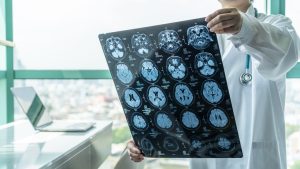Why Early Diagnosis Matters in Traumatic Brain Injury Cases
 You’re in a car crash, maybe a fall, maybe something else that rattles you, literally. At first, you think you’re fine. You’re experiencing no bleeding and have no broken bones. You just feel physically shaken up. Maybe a little dizzy, or perhaps you’re dealing with a headache that won’t quite go away.
You’re in a car crash, maybe a fall, maybe something else that rattles you, literally. At first, you think you’re fine. You’re experiencing no bleeding and have no broken bones. You just feel physically shaken up. Maybe a little dizzy, or perhaps you’re dealing with a headache that won’t quite go away.
But what if that headache isn’t just a headache? What if it’s the beginning of a traumatic brain injury?
In North Dakota, as in most places, early diagnosis of a TBI is important for more than your health. It’s also central to your legal case. If someone else caused the accident that hurt you, you may be entitled to compensation. But without a prompt, well-documented diagnosis, it can be hard to prove just how serious the damage is.
Traumatic brain injuries don’t always show up right away
When you hear the phrase “traumatic brain injury,” you might picture someone in a coma or with a visible head wound. But TBIs come in all shapes and sizes. Some are severe, yes, but many are subtle, and some symptoms may take days or even weeks to appear.
Here are some common symptoms of a mild or moderate TBI:
- Headaches that won’t go away
- Trouble focusing or remembering things
- Sensitivity to light or sound
- Fatigue or mood swings
- Dizziness or balance problems
- Changes in sleep patterns
You might not link these symptoms to the accident at first. Or you might assume they’ll go away on their own. But ignoring them or delaying a trip to the doctor can hurt your recovery and your ability to build a strong legal claim.
Why early diagnosis matters medically
The brain is complex and delicate. Even a minor blow can disrupt how it processes information, controls your body, or regulates emotions. And while your body can often heal itself, brain injuries don’t always fix themselves.
A quick diagnosis means:
- You get the right treatment early
- You reduce the risk of complications
- You can monitor symptoms over time
- You set the stage for a clearer recovery plan
In other words, there’s more here than proving that you were hurt. The goal is to help your brain heal.
Why early diagnosis matters legally
Perhaps you wait a few weeks to see a doctor. The symptoms have been building, but you’ve powered through. Now you finally get checked out, and your provider confirms you have a concussion or other TBI.
From a medical standpoint, that’s helpful. But from a legal perspective, the gap between the accident and the diagnosis creates doubt. The insurance company may argue that something else caused the injury, or that it’s not as serious as you claim.
That’s where early documentation can help. When you’re seeking compensation for a brain injury, brain injury lawyers rely on medical records to:
- Show the timing and severity of your symptoms
- Connect your injury to the accident
- Track how the injury affects your life over time
- Support expert testimony about your condition
In North Dakota, you’ll need clear, consistent evidence to win damages in a personal injury case. The longer you wait to get a diagnosis, the harder that gets.
North Dakota’s legal framework for brain injury claims
If your TBI was caused by someone else’s negligence, say a distracted driver or a poorly maintained property, you may be entitled to compensation. That could include:
- Medical expenses (past and future)
- Lost wages or reduced earning capacity
- Pain and suffering
- Emotional distress
- Long-term care or rehab costs
North Dakota follows a modified comparative fault rule. That means if you’re found partially at fault for the accident, your compensation could be reduced. And if you’re 50% or more at fault, you may recover nothing.
This is why evidence matters. Strong medical records, early diagnosis, and expert evaluations help show the full picture and push back against arguments that you weren’t really hurt, or that you’re exaggerating your symptoms.
The role of expert testimony in brain injury cases
You might be thinking, “It’s my brain. I know how I feel.” And you’re right. But in court, your experience needs backup.
That’s why expert witnesses are so important. In TBI cases, your brain injury lawyer may bring in:
- Neurologists – To explain the medical nature of your injury
- Neuropsychologists – To judge cognitive, emotional, and behavioral changes
- Vocational experts – To show how the injury affects your ability to work
- Life care planners – To estimate long-term care and treatment needs
These experts turn complex brain science into language juries and judges can understand. However, their testimony is only as strong as the documentation behind it. Early medical evaluations give these professionals something concrete to work with.
What to do after a head injury
If you or someone you love has been in an accident, even if it seems minor, here’s what you should do:
- See a doctor right away. Ask specifically about the possibility of a concussion or brain injury.
- Be honest about your symptoms. Even if they seem small or unrelated.
- Follow all medical advice. Go to follow-ups, take prescribed medication, and keep track of changes.
- Document everything. Start a journal or log of symptoms, treatments, and how your life has been affected.
- Talk to a brain injury lawyer. The earlier you involve an attorney, the better they can protect your rights.
Why legal help matters in brain injury cases
Brain injury claims are some of the most challenging personal injury cases. They’re invisible, unpredictable, and often lifelong. And insurance companies know that.
They’ll look for any reason to downplay your injuries or shift blame. They might offer a fast settlement that doesn’t come close to covering your actual losses.
An experienced brain injury lawyer can help you:
- Gather strong medical evidence
- Work with top-notch medical experts
- Deal with the insurance company
- Calculate a fair value for your claim
- Take your case to court if needed
At Larson Law, we’ve seen firsthand how early action makes a difference in both medical treatment and case outcomes. The sooner you get a diagnosis and legal help, the more control you’ll have over what happens next.
Helping to heal your brain
Brain injuries don’t always look dramatic and don’t always show up on scans. However, they can change everything, including how you think, feel, work, and relate to others.
If you’ve been hurt in an accident in North Dakota, don’t wait to get checked out and don’t wait to get help. Early diagnosis is more than a medical decision; it’s a legal strategy.
Let us help you protect your future. Contact Larson Law today for a free consultation.

Mark Larson is a Certified Civil Trial Specialist and Certified Civil Pre-Trial Specialist focusing on personal injury, car accidents, wrongful death, and oil field claims. Since 1979, Larson Law has served the injured throughout North Dakota. Read more about Mark V. Larson.
